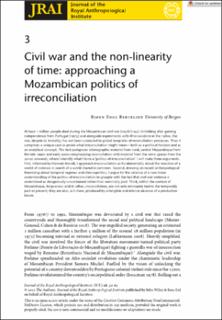| dc.description.abstract | At least 1 million people died during the Mozambican civil war (1976/7-92). Unfolding after gaining independence from Portugal (1975) and alongside experiments with Afro-socialism in the 1980s, the war, despite its brutality, has not been subjected to global templates of reconciliation processes. Thus it comprises a unique case to probe what irreconciliation might mean – both as a political horizon and as an analytical concept. This text juxtaposes ethnographic material from rural, central Mozambique from the late 1990s and early 2000s emphasizing reconciliation with material from the same spaces from the 2010s onwards, where I identify what I term a ‘politics of irreconciliation’. I will make three arguments. First, informed by Hannah Arendt, I approach irreconciliation as fundamentally about the rejection of a world of violence in search of a world shared in common. Second, drawing on recent anthropological theorizing about temporal regimes and chronopolitics, I argue for the salience of a non-linear understanding of the politics of irreconciliation to grapple with the fact that civil war violence is understood as dangerously uncontained rather than nominally past. Third, within the context of Mozambique, forgiveness and its other, irreconciliation, are not only intimately tied to the temporally past or present; they are also, as I show, produced by a tangible and intense absence of a productive future. | en_US |

